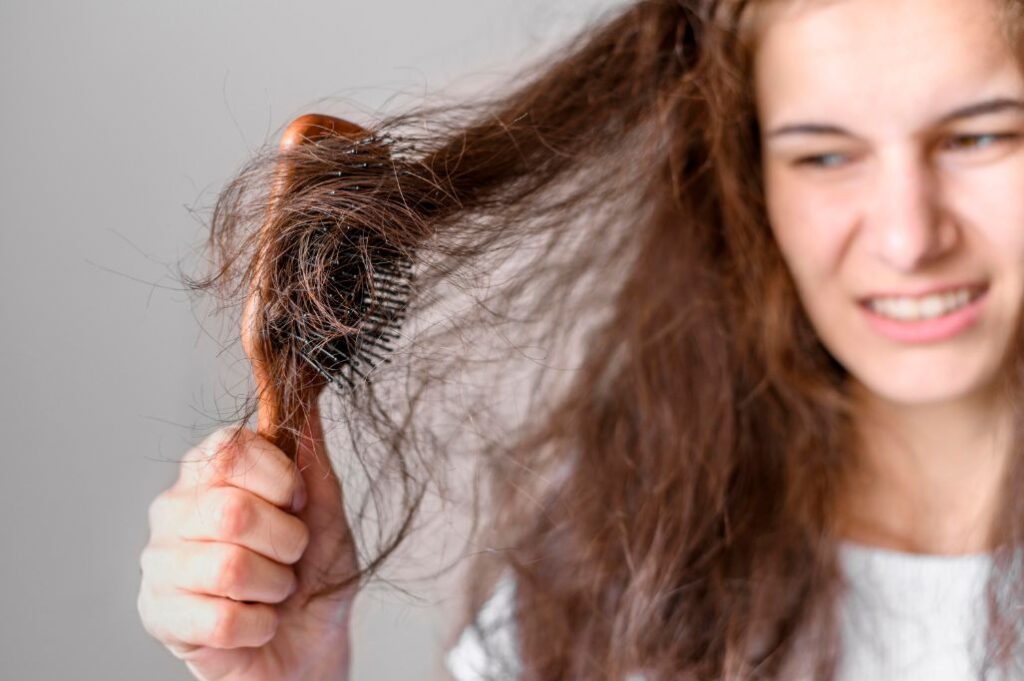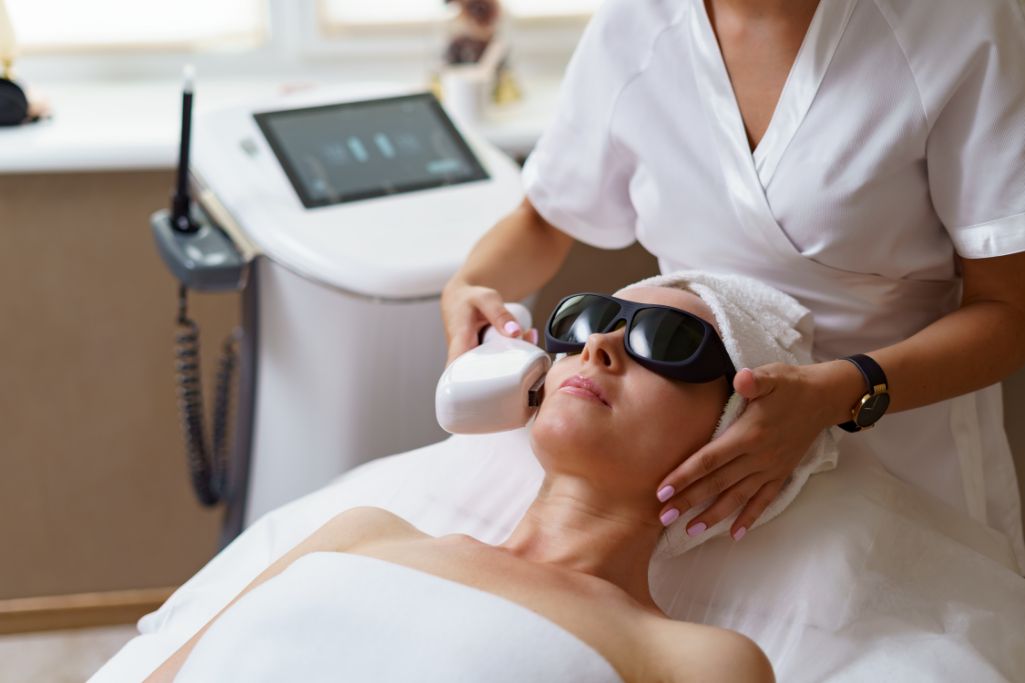Of Hair has always been significant in discussions and how we view ourselves since it highlights our individuality and attractiveness. Hair loss affects more than just one’s physical appearance; it can have a substantial impact on one’s confidence and sense of self-worth. Now let’s examine the top 10 reasons of hair loss.
Hair loss, or alopecia, is a complicated disorder impacted by hereditary and environmental factors. Hair loss is more than simply a cosmetic issue; it demonstrates the complex interplay between heredity, lifestyle, and health. Contact a dermatologist for Best Dermatologist In Aurangabad as soon as you detect thinning hair or if hair starts falling out. They can determine the cause of your hair loss and assist you in learning how to stop hair fall or encourage hair growth. visit now for the DermaConsult clinic in Aurangabad Our mission is to increase your self-esteem, assist you in understanding hair loss, and recognize that every person’s path to healthy hair is unique
Different Alopecia Varieties
The term “alopecia” in scientific terminology describes hair loss. Alopecia areata, traction alopecia, and androgenic alopecia are among the various forms of hair fall that are frequently observed in both men and women.
Male and female pattern hair loss, or androgenetic alopecia, is mostly brought on by hormonal imbalances and genetics, particularly an excess of androgens.
An autoimmune disorder called alopecia areata develops when the body’s defense system mistakenly targets and kills hair follicles.
Less well-known but no less significant, scarring alopecia produces inflammation that irreversibly harms hair follicles.
Traction alopecia, which results from constant hair tension or tight hairstyles, is another cause of hair loss. Identifying and treating the causes of hair loss requires an understanding of the various forms of alopecia.
Other Infectious Immune Conditions
Alopecia can also be brought on by illnesses like lupus and Hashimoto’s thyroiditis. This kind of alopecia might not go away. Furthermore, certain drugs linked to these conditions might prevent the growth of new hair.
Therefore, before considering hair restoration therapies, your doctor must keep a close eye out for any new symptoms or changes in your health.
Virus Infection
Infections and illnesses can also be causes of hair loss. Temporary hair loss may be brought on by an extreme infection or high temperature. These could include bacterial infections like syphilis and fungal skin diseases, both of which can cause hair loss or thinning hair.
Regrowing hair and reducing the chance of more hair loss can be achieved by treating the disease’s underlying cause. Therefore, you should take care of the underlying health condition by getting medical attention as soon as possible.
Abruptions in Hormonal Balance
Hormonal imbalances and an excess of androgens are the main causes of hair loss. Both male and female pattern baldness are influenced by androgens. In female-pattern baldness, androgens can damage hair follicles, which causes excessive hair shedding.
On the other hand, male pattern baldness is linked to an increase in the androgen hormone called dihydrotestosterone (DHT). DHT may also shorten the lifespan of hair in addition to attaching to hair follicles and slowing down hair development.
Thyroid Conditions
Hair loss can also be caused by other disorders that are related to hormones. Thyroid hormones might be used in several situations. Both hypothyroidism (an underactive thyroid) and hyperthyroidism (an overactive thyroid) can cause hair loss since they both result in a hormonal imbalance.
Thyroid hormones have a critical role in regulating many body processes, including the growth of hair. Either of these thyroid issues can be efficiently treated to control hormone levels, stop hair loss, and promote hair growth.
Pregnancy
Women may experience hair loss during their pregnancies and delivery. A common problem affecting women all over the world who have recently given birth is postpartum hair loss. Temporary variations in hair growth cycles are caused by a considerable rise in estrogen levels during pregnancy.
It is common for postpartum mothers to notice patches of baldness or even hair loss. After giving delivery, postpartum alopecia often appears two to four months later and can linger up to 18 months. Particularly in women with long hair, postpartum hair loss is most noticeable along the hairline.
The follicles in your hair will recuperate at the same time as the rest of your body. While avoiding postpartum hair loss completely is impossible, you can lessen the problem by taking prenatal vitamins regularly and treating your hair gently.
Particular Drugs
Medication provided for common health issues might potentially cause hair loss. We refer to this disorder as “drug-induced alopecia.” Hair thinning or baldness may be brought on by medications such as beta-blockers, calcium channel blockers, anticoagulants, birth control pills, antidepressants, and anti-inflammatory drugs. Another cause of hair loss is the overuse of retinoids. Some chemotherapy drugs used in cancer treatment can cause total hair loss while they work to destroy malignant cells. But, it would help if you spoke with a physician before stopping any recommended medicine. To see if it helps with hair loss, the doctor might want to switch you to a different medicine.
Low Consumption of Nutrients
Because vitamins and minerals are essential for the hair development cycle and cellular regeneration, deficiency in these nutrients is a typical cause of hair loss and stunted growth. Hair loss can be brought on by low intakes of iron, zinc, biotin, and protein. A balanced diet rich in vitamins, minerals, and protein promotes general health by supporting the proper operation of all systems and organs.
Nutrient deficiencies and hair loss ranging from thinning to bald patches can be brought on by inadequate nutrition or overly restrictive crash or fad diets. It is best to speak with your doctor before using over-the-counter vitamins to address any potential deficiencies.
Physical Trauma
Hair might fall out in clumps due to disruptions in the normal cycle of growth and rest caused by intense physical stress. A sudden disruption to the body, like a severe illness, surgery, thermal damage, or traumatic accident, can also shock the hair follicles.
We refer to this type of hair loss as telogen effluvium. Within the next six to eight months, it might resolve on its own.
Uncertainty
Hair loss may result from psychological stress to a considerable degree. A significant number of persons have acute telogen effluvium, a disorder in which up to 70% of hair follicles enter a resting (telogen) state.
These figures are in contrast to the typical range of 10–20% of hair follicles that are typically in the telogen phase. This type of hair loss is usually temporary. Regular hair growth can be restored by stress management that is effective.
Trichotillomania
A psychiatric condition called trichotillomania is typified by an obsessive need to pluck one’s hair out. This problem may be made worse by anxiety disorders such as obsessive-compulsive disorder and others. In addition to the obsessive hair-pulling behavior, there is a noticeable region of hair loss after the hair-pulling behavior, which is followed by a feeling of relief or pleasure.
Stressed-out individuals with a history of hair pulling and hair loss may also develop trichotillomania. Cognitive behavioral therapy and habit reversal training may assist build alternate coping mechanisms if you suspect this mental health condition. Exposure to air pollution for an extended period may exacerbate hair issues and lead to bald spots
Hard water
After shampooing the hair, minerals from hard water, like calcium and magnesium, may build up on the scalp.
Mineral buildup can result in dry, brittle hair that is more difficult to manage. Damage to the texture of the hair, dullness, and increased tangling are possible adverse effects. Water softeners are a useful tool for keeping hair healthy.
Conclusion
Knowing why you are losing more than 100 hairs a day and practicing good self-care practices will assist. Hormone imbalances, lifestyle decisions, genetic predispositions, and environmental factors are some of the causes of hair loss. Since hair highlights your individuality and beauty, it’s critical to comprehend the intricacies of hair loss. If you can visit now for hair clinic in Aurangabad You ought to use stress-reduction techniques like aromatherapy, massage, and relaxation training.
Read more about How effective is the treatment for vitiligo.


